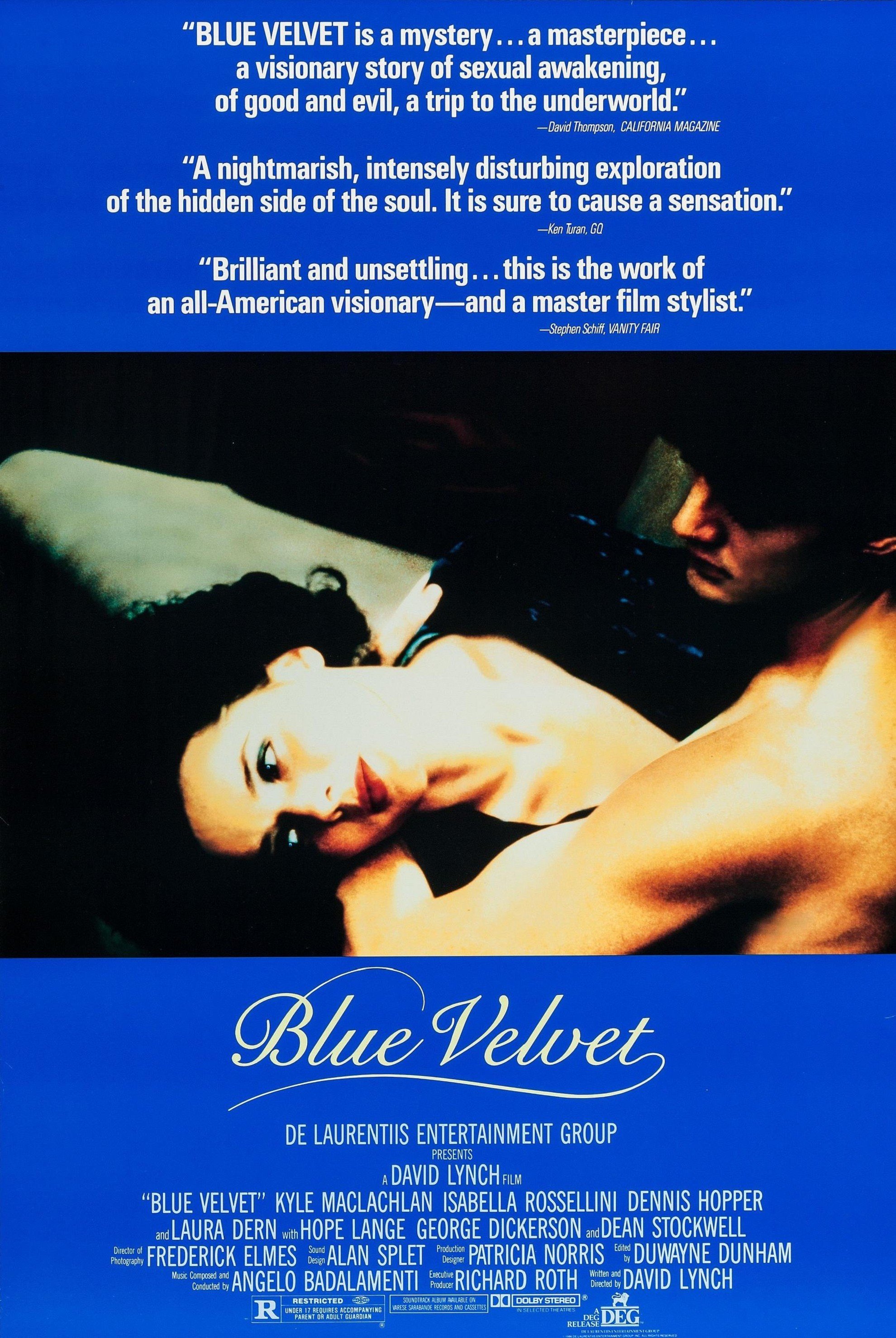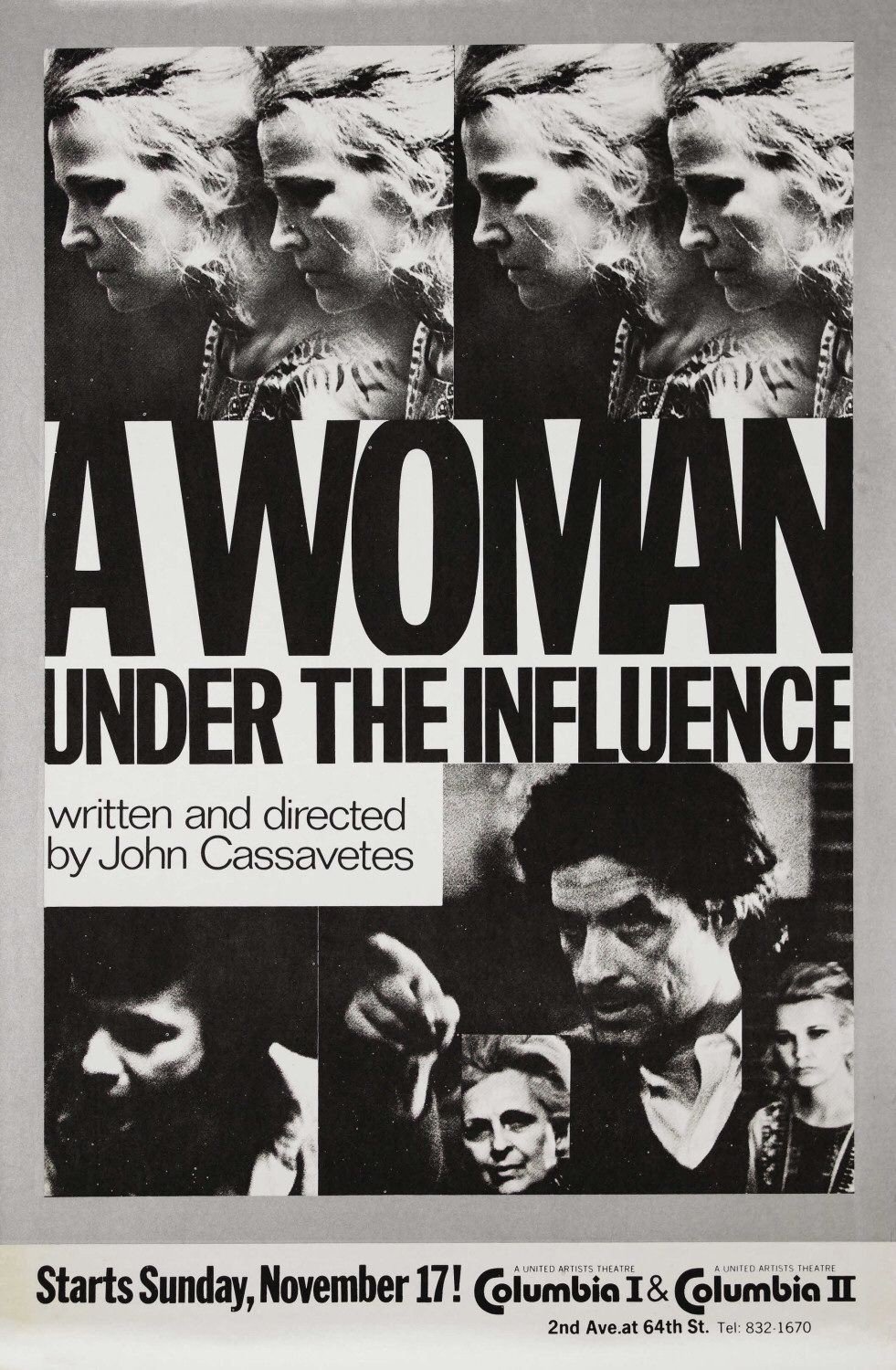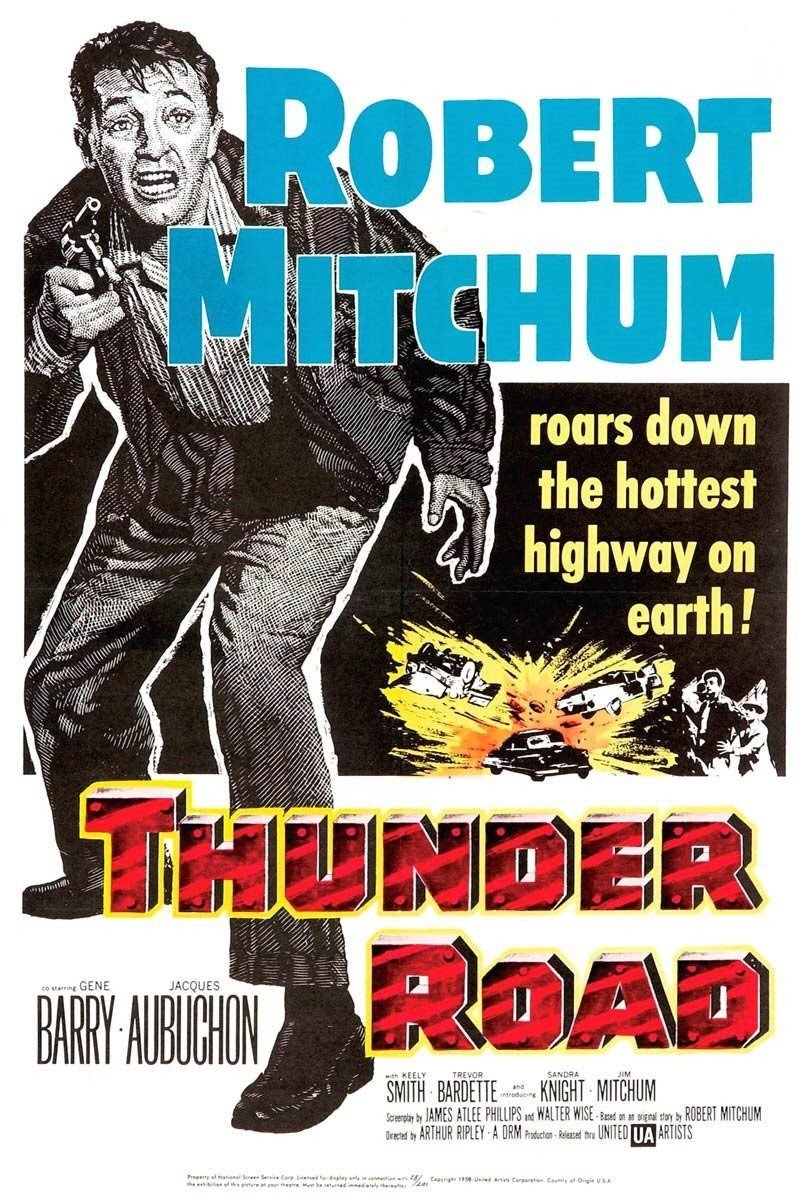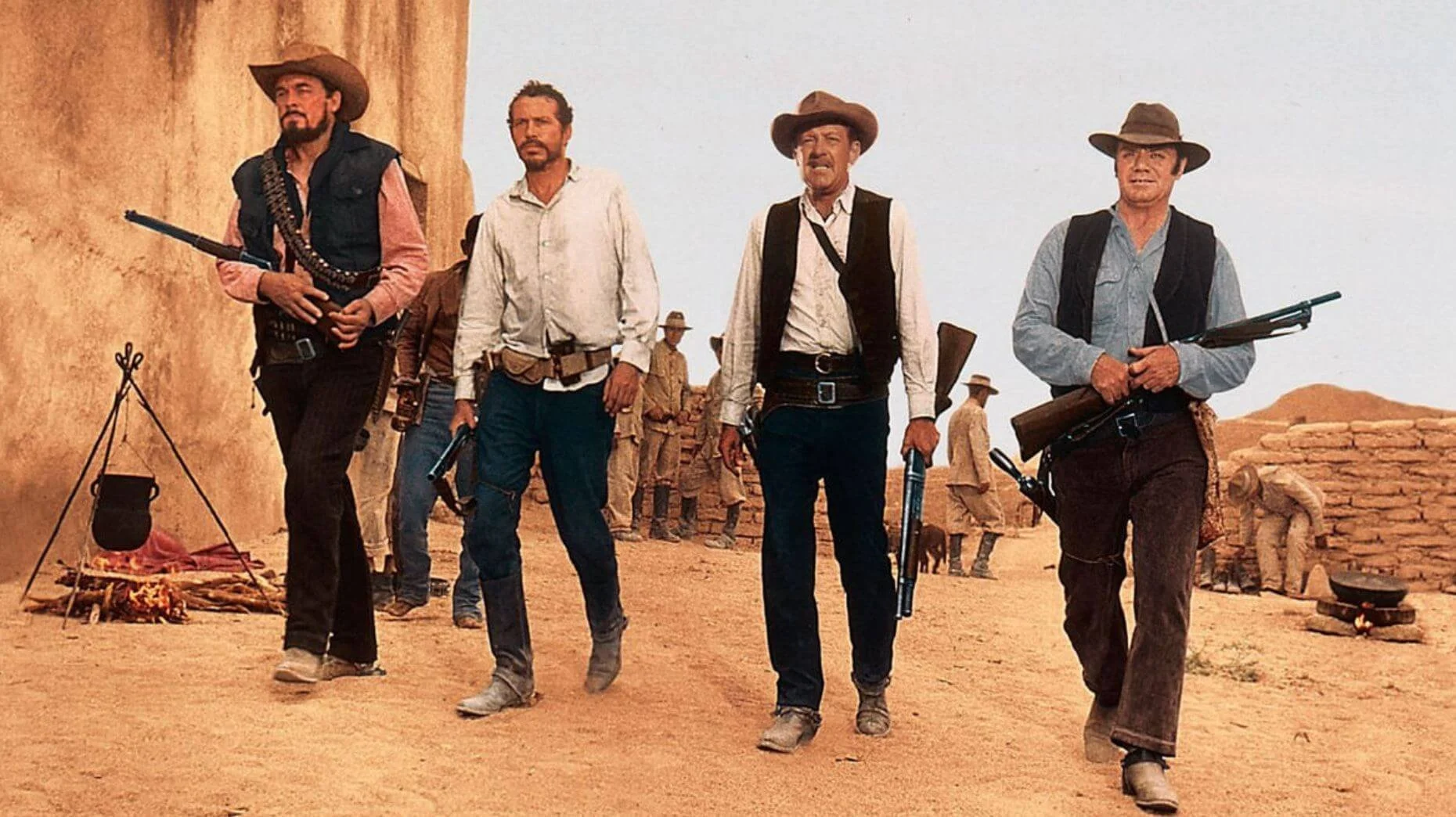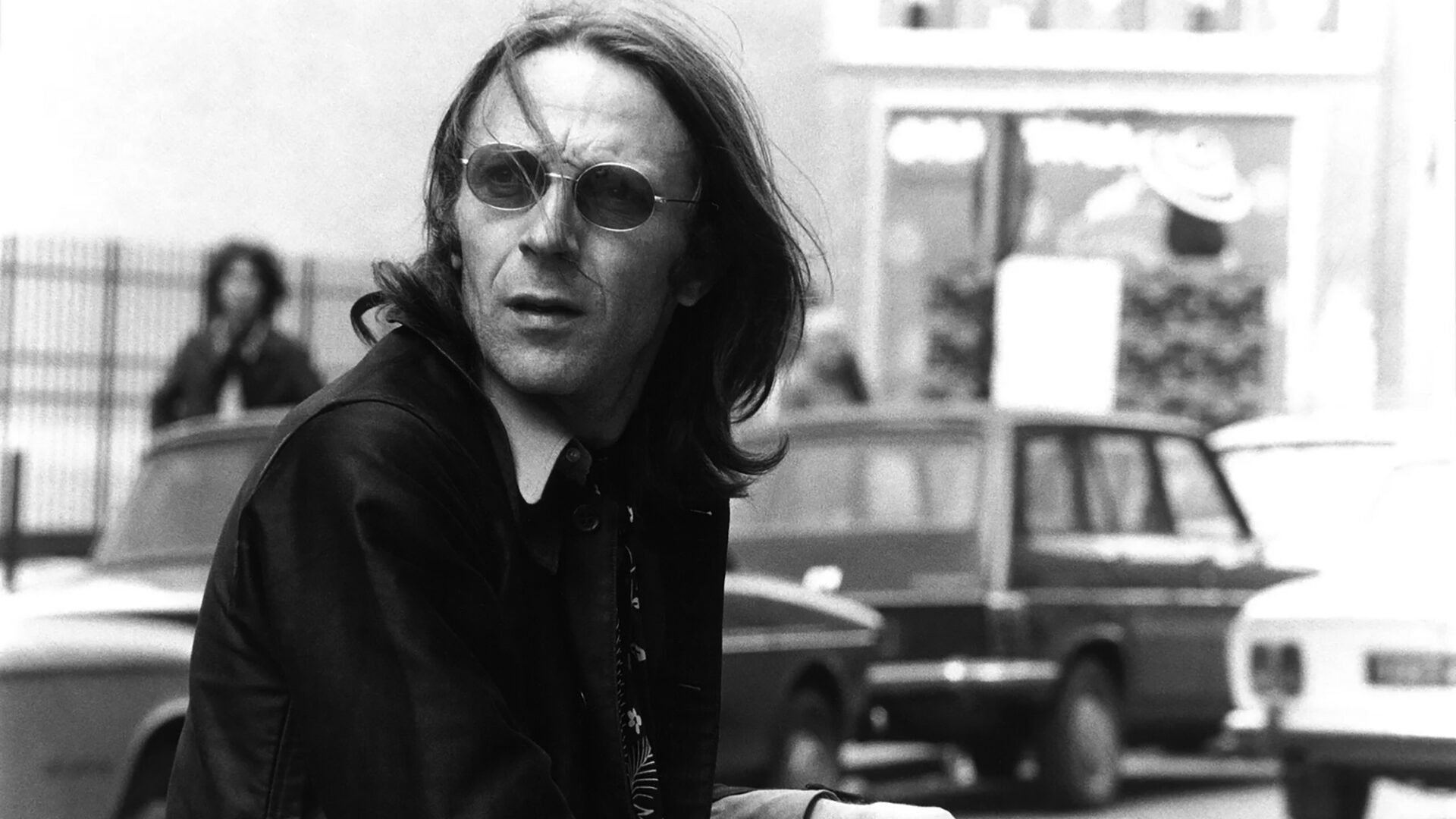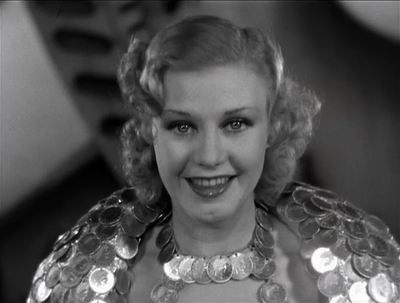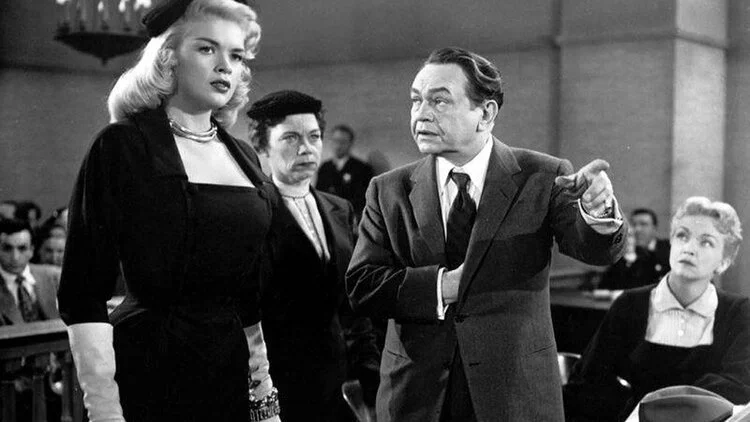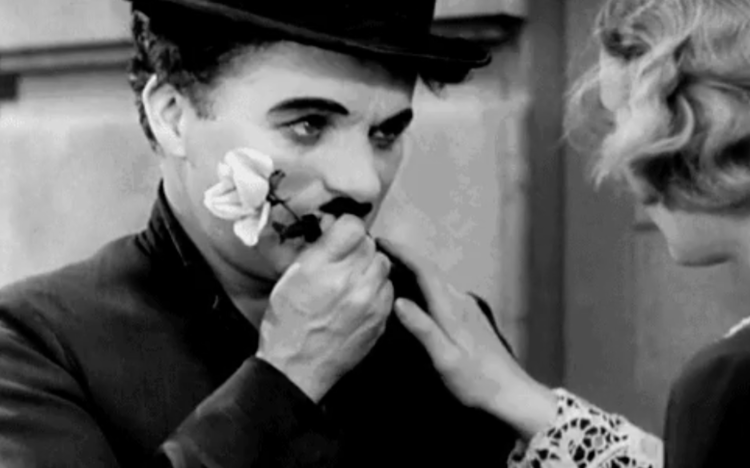"Now Listen to Me..."
Just some thoughts on this month’s happenings:
Classic film screenings from around the world this July include:
In London, United Kingdom The Prince Charles Cinema will present Blue Velvet (1986, a 35mm print) Saturday, July 1, The Tall T (1957, a 4k presentation, as part of their RANOWN WESTERNS: DIRECTED BY BUDD BOETTICHER series) Monday, July 3 and Thursday, July 27, Gladiator (2000, a 35mm print) Wednesday, July 5, A Woman Under the Influence (1974, a 35mm print, as part of their GENA & JOHN series) Thursday, July 6, Thunder Road (1958, a 35mm print, a 65th Anniversary Screening) Friday, July 7 and Sunday, July 9, The Good, the Bad & the Ugly (1966, a 35mm print) Sunday, July 9, Decision at Sundown (1957, a 4k presentation, as part of their RANOWN WESTERNS: DIRECTED BY BUDD BOETTICHER series) Saturday, July 15, The War of the Worlds (1953, a 35mm print, a 70th Anniversary Screening) Monday, July 17 and Sunday, July 30, One-Eyed Jacks (1961, a 35mm print) on Saturday, July 29.
* Note: Some of the above showtimes are matinees only.
Click on the film’s respective image for more information. To see July’s complete programming, click on The Prince Charles Cinema banner above.
In Milwaukee, Wisconsin, The Milwaukee Symphony Orchestra will present Jaws with live musical accompaniment featuring John Williams’ thrilling score on Saturday, July 1.
Click on the above image for more information.
In New York City, New York, Film Forum is presenting Midnight Cowboy (1969, a new 4k restoration) from July 1 - 6, and Contempt aka Le mépris (1963, a new 4k restoration, in celebration of this film’s 60th Anniversary) from July 1 - 13.
Also showing is WRITTEN AND DIRECTED BY BILLY WILDER from Friday, July 14 – Thursday, August 3.
The programme reads:
A three-week festival of the legendary Hollywood director and screenwriter’s genre-spanning work. With over 30 films, most in 35mm, including SUNSET BLVD., DOUBLE INDEMNITY, THE LOST WEEKEND, THE APARTMENT, ACE IN THE HOLE, BALL OF FIRE, SOME LIKE IT HOT, SABRINA, A FOREIGN AFFAIR, THE SEVEN YEAR ITCH and many more.
For more information on either the films or the Billy Wilder series, click on the appropriate still above. For a complete calendar of all the films playing this month, click on the Film Forum banner.
In Los Angeles, California The Beverly Cinema will present Jaws (1975, a 35mm print) Saturday July 1 and Sunday, July 2, Minority Report (2002, a 35mm print) Friday, July 7, L'Avventura (1960, a 35mm print) Thursday, July 13 and Friday, July 14, Hook (1991, a 35mm print) Saturday, July 22 and Sunday, July 23, Starship Troopers (1997, a 35mm print) Friday, July 28, and The Blair Witch Project (1999, a 35mm print) on Saturday, July 29 at midnight only.
* Note: Some of the above showtimes are matinees only.
Click on the respective image for more information. To see the rest of July’s schedule, click on The Beverly Cinema banner above.
In Santa Monica (part of greater Los Angeles) California, The American Cinematheque Aero Theatre will present Jaws (1975, a 35mm print) Saturday, July 1, Monday, July 3 and Tuesday, July 4, Spartacus (1960, a 70mm print, as part of their ‘Ultra Cinematheque 70 Fest 2023’) Saturday, July 8, 2001: a Space Odyssey (1968, The American Cinematheque’s own pristine 70mm archival print, as part of their ‘Ultra Cinematheque 70 Fest 2023’) Sunday, July 9 and Tuesday, July 11, The Wild Bunch (1969, a 70mm print, as part of their ‘Ultra Cinematheque 70 Fest 2023’) Friday, July 14, Lawrence of Arabia (1962, a 70mm print, as part of their ‘Ultra Cinematheque 70 Fest 2023’) Saturday, July 15, Apocalypse Now (1979, a Rare 70mm Print Courtesy of the George Eastman Museum and the Martin Scorsese Collection, as part of their ‘Ultra Cinematheque 70 Fest 2023’) on Friday, July 21, Friday, July 28 and Saturday, July 29.
In Los Feliz (also part of greater Los Angeles) The American Cinematheque Los Feliz 3 Theatre will present Blow-Up (1966, a 35mm print) Saturday, July 1, The War of the Worlds (1953, a 35mm print, a 70th Anniversary Screening, along with an Introduction by author and film historian Justin Humphreys) Sunday, July 2, and Contempt aka Le mépris (1963, a new 4k restoration, in celebration of this film’s 60th Anniversary) on Friday, July 14, Saturday, July 15 and Sunday, July 16.
* Note: Some of the above showtimes are matinees only.
For more information specifically on each of these programmes, click on the corresponding image. To see the entire month of July’s programming including other films showing at both the Aero Theatre in Santa Monica and The Los Feliz 3 Theatre in Los Feliz, click on the American Cinematheque banner.
In theatres across the U.S. Flashback Cinema is presenting Jaws (1975) on Sunday, July 2 and Wednesday, July 5.
Click on the poster image for more information. To see the entire month’s programming, click on The Flashback Cinema banner above.
In Auckland, New Zealand Academy Cinemas is presenting Winchester ‘73 (1950) Tuesday, July 4, Sahara (1943) Sunday, July 9, Taxi Driver (1976) Monday, July 10, and Casablanca (1942) on Saturday, July 15.
To obtain more information specifically on each of these programmes, click on the corresponding image. To see the entire month of July’s programming, click on the Academy banner above.
In Valencia, Spain, Culturarts Generalitat IVAC – La Filmoteca at the Edificio Rialto will be presenting Act of Aggression aka L'agression (1975, as part of their FRENCH FLEECE programme) on Tuesday, July 4 and Wednesday, July 5.
Click on the film’s image for more information on this screening. To discover more of July’s programming including other films playing in Valencia Spain at the Edificio Rialto, and in Castelló Spain at The Museum of Fine Arts of Castelló, click on the banner image above.
In Melbourne, Australia The Astor Theatre is presenting E.T. the Extra-Terrestrial (1982, a 4k digital presentation, featuring an extended pre film introduction from star Henry Thomas Live on Stage in collaboration with Metro Comic Con) on Saturday, July 8.
Click on the poster image for more information on this screening. To see the rest of July’s schedule, click on The Astor Theatre banner above.
In Vancouver, British Columbia, The Cinematheque will present WHEN THE CAMERA IS ON, CINEMA IS HAPPENING: THE COMPLETE WORKS OF JEAN EUSTACHE from July 13 - 31.
For more information about this series, click on the top image above. For other films scheduled this month at The Cinematheque, click on the theatre banner.
Noir City will take place in Philadelphia, Pennsylvania from July 21 - 23. Highlights include Larceny (1948, a 35mm print) Saturday, July 21, Night Has a Thousand Eyes (1948, a 35mm print) Sunday, July 22, and Sorry, Wrong Number (1948) on Sunday, July 22.
For more information including the complete schedule, click on the image above.
In Los Angeles, California Secret Movie Club is presenting at the Secret Movie Club Theater a double bill of El Topo (1970, a 35mm print) and The Holy Mountain (1973, a 35mm print) on Thursday, July 27.
For more information on this presentation, click on the appropriate movie image. To discover other screenings organised by this group, click on the above theatre image.
In San Francisco, California The San Francisco Symphony will present Raiders of the Lost Ark (1981) with live musical accompaniment featuring John Williams’ exhilarating score on Thursday, July 27 and Sunday, July 30.
Click on the above image for more information.
In theatres across the U.S., Fathom Events is presenting Heathers (1988, a 35th Anniversary Screening) on Sunday, July 30.
Click on the film’s poster image for more information. To see this month’s entire schedule, click on The Fathom Events banner above.
There are 33 recommended films to watch on Turner Classic Movies in the U.S. this month:
Many readers have taken me to task for my inclusion of Casablanca (1942) on a list of “All that Glitters”: The Overrated. I would simply ask that they read what I wrote about this revered classic before judging me too harshly. There is much to praise about the film contained in my review and the weaknesses I've observed are, I feel, worthy of consideration. In any event, please indulge in this motion picture's magic and let me know if my criticisms have merit. The journey begins Sunday, July 2 at 1 pm PDT.
After World War II, many returning servicemen were disillusioned to find jobs were scarce and their wives’ (or girlfriends’) faithfulness even scarcer. The Best Years of Our Lives (1946) addresses this reality head on when the Dana Andrews character finds it impossible to please either his previous employer or trophy wife upon his return to civilian life. Perhaps for this narrative distinction, authors Borde and Chaumeton referred to The Best Years of Our Lives in their highly respected book “Panorama of American Film Noir 1941 - 1953”, the first to be published on the subject.
The film portrays no crime, the focus is not on Andrews’ experiences alone, and he comes out better off at the end without his superficial but admittedly gorgeous wife, which for myself, collectively place this film well outside of noir’s dark and gloomy world of illegal activity. Previously, I highly praised The Best Years of Our Lives for its exceptional musical score composed by Hugo Friedhofer in the first part of a series entitled Top Ten: Motion Picture Music Treasures. This emotionally powerful tour de force will commence Sunday, July 2 at 5 pm PDT.
Please have a read here and see why Gold Diggers of 1933 is as enjoyable and pertinent as the shows these spirited characters struggle to produce. The show must go on Monday, July 3 at 11:15 am PDT.
Make way for the rapturous Stanley Donen directed musical Seven Brides for Seven Brothers (1954), reviewed here, Tuesday, July 4 at 8:30 am PDT.
Next up is the remarkably understated, albeit compelling, racial drama Intruder in the Dust released in 1949. Still deserving of more critical acclaim, this filmed adaptation of literary giant William Faulkner’s novel will grace TCM Thursday, July 6 at (early morning) 1 am PDT and is reviewed as a DVD recommendation here.
The next TCM recommendation has been reviewed in Opening Up a Treasure: The Night of the Hunter. This highly expressionistic Grimm-like fable, released in 1955, appears as if conveyed from a child's point of view. The "hunter" will appear Thursday, July 6 at 11:45 pm PDT.
1972's The Getaway, is not nearly as meaningful or resonant as some of Sam Peckinpah's earlier films; still, as a genre piece, it punches solidly above its pay grade. The Getaway recommended here, will ensue Friday, July 7 at 5 pm PDT and again on Saturday, July 15 at 10:45 pm PDT.
My next recommendation is one of those lesser known films noir with a most appropriate title: Impact (1949). One can experience this captivating little cinematic explosive, previously reviewed here, in host Eddie Muller's Noir Alley Saturday, July 8 at 9 pm PDT and again on Sunday, July 9 at 7 am PDT.
TCM is showing Guess Who’s Coming to Dinner (1967) on Sunday, July 9 at 1:15 pm PDT. This is a film I’ve been rather dismissive of in my brief review which can be read here. On the plus side, all of the able-bodied cast members offer solid performances.
Next up are a couple of exciting films noir that first arrived on the scene in 1953, appearing back to back on TCM:
Barbara Stanwyck stars as a devoted wife trying to save her husband (played by Barry Sullivan) but equally determined to match wits against killer Ralph Meeker in order to do so, in the previously recommended (here) noir, 1953's Jeopardy. This life or death struggle will commence Tuesday, July 11 at 5:15 am PDT.
Crime Wave (1953), previously reviewed here, is one wave you'll want to catch Tuesday, July 11 at 6:30 am PDT and returning on Saturday, July 22 at 3:30 pm PDT.
In 1967, British Director John Boorman nailed the American crime milieu with the precision of his film's title, Point Blank, a neo-noir masterpiece fortified with style and driven by purpose.
Lee Marvin's 'cold as a frozen corpse' Walker, is a machine-like man on a mission, appearing unstoppable as he charges through LAX possessed with unbridled vengeance. It's also quite ironic that despite Walker's hardened resolve, the considerable threat he poses, generous amount of punishment he dishes out, and the high body count he seems responsible for, doesn't directly kill anyone in the entire picture. "Was it a dream?" You be the judge when Point Blank (first acclaimed here) hits Tuesday July 11 at 1 pm PDT.
Sadly, still another incredible performer from The Heart is a Lonely Hunter (1968) has been lost to us, this time its star, Alan Arkin, such a substantial loss to the acting community. Here is where viewers can discover “why.” A previous TCM recommendation here, movie lovers can realise a wealth of emotion by tuning in Thursday, July 13 at (early morning) 12:45 am PDT.
Another film noir worth checking out (although not so well known), is 1955’s Illegal previously reviewed here. Instead of playing an insurance agent as he does in Double Indemnity, Edward G. Robinson is a shifty lawyer who quite literally, and like the film itself, packs a solid punch. Illegal’s activity can be observed on TCM Thursday, July 13 at 11:30 pm PST.
From the same director who brought us Citizen Kane comes another kind of cinematic hero (of sorts). Michael O'Hara, like the deeply flawed Kane, is flawlessly played by his creator Orson Welles. Unlike Citizen Kane however, this film fell under its producer Harry Cohn's butchery with considerable footage lost and destroyed forever. Nevertheless, what survives is vastly entertaining and not to be missed. The Lady from Shanghai (1947) was also previously recommended here and will reappear on TCM Saturday, July 15 at 3:15 pm PDT.
Dark Passage (1947) is a wildly engrossing film noir that combines the best of romance with the best of noir in the best location for both: San Francisco. Previously endorsed as a Blu-Ray release here, Bogart will make his dark (rite of) passage on Sunday, July 16 at (early morning) 1 am PDT.
After directing Colorado Territory, Raoul Walsh’s very next film retained all of that film’s energy and even added some for White Heat (1949), previously reviewed here. TCM's screen will heat up Monday, July 17 at 5:30 am PDT.
Next is the unmissable Busby Berkeley extravaganza Footlight Parade (1933) also a previous TCM recommendation here. Let the show begin Monday, July 17 at 9:30 am PDT.
The following is an ultra-rare showing of the delightful pre-code wonder, Hidden Gem #74: If I Had a Million (1932). TCM Subscribers cannot afford to miss this richly rewarding film Monday, July 17 at 11:15 pm PDT.
Allison Skipworth, W. C. Fields
Despite its ridiculously hard to follow plot, this next recommendation's wildly entertaining detective yarn is worth waking up for.
Previously reviewed here, The Big Sleep (1946) will awaken Tuesday, July 18 at 1:15 pm PDT.
A most talented friend on Facebook, Leilani Roundtree, has graciously allowed me to post her own very special modernised trailer for The Big Sleep. This amazing work both spoofs contemporary coming attractions while paying homage to the early classic in a most delightful way. Enjoy!
A film well worth seeing is Network (1976), previously reviewed here. This “mad as hell” exposé of just how far some TV executives will go to exploit for profit a former news anchor’s severe “on the air” mental breakdown, will itself air on TCM Saturday, July 22 at (early morning) 1:45 am PDT.
TCM will present Charlie Chaplin’s charming cinematic love letter 1931’s City Lights (previously reviewed here) Sunday, July 23 at 5 pm PDT.
This next recommendation is a modest but skilfully mounted western packed with suspense, The Stalking Moon (1968), perviously reviewed here. The stalking will begin Monday, July 24 at 3 pm PDT.
Also from 1968 is Hidden Gem #1, essayed in a less analytical and more personal fashion in Inspecting Hidden Gem #1: The Swimmer. The film airs Monday, July 24 at 9 pm PDT. I hope readers and viewers will peruse my thoughts on this somewhat neglected and generally undervalued film.
One of Alfred Hitchcock’s more uncustomary, yet distinguished, offerings is 1953’s I Confess previously reviewed here, featuring a fervent, introspective performance from Montgomery Clift. This highly engrossing confessional can be heard (and seen) Tuesday, July 25 at 11:15 am PDT.
Besieged with production problems, and sometimes wrongfully criticised because of them, this next TCM recommendation is, nevertheless, an accomplished and splendorous piece of dramatically dynamic adventure storytelling: the 1962 version of Mutiny on the Bounty showing on TCM (updated) Saturday, January 10 (2026) at 10:45 am PST.
TCM's current schedule can be seen by clicking on any of the above TCM related images. To confirm the correct Pacific Standard (West Coast) showtime information, subtract 3 hours from the Eastern Standard (East Coast) showtime listed on TCM’s schedule.
Mutiny on the Bounty (1962) is also July’s Blu-ray recommendation, reviewed at the end of this column.
My next recommendation is Straight Time (1978).
This is Hidden Gem #51, its strong authenticity due to having been made from ex-con Edward Bunker's novel, the author's participation in writing the screenplay and consultation during production. Plus, director Ulu Grosbard (See: End Credits) provides his customarily derived natural performances from an incredible ensemble cast (chosen by the film's star Dustin Hoffman). The prisoner is being released at TCM Friday, July 28 at 5 pm PDT.
Then there’s 1974's Freebie and the Bean. This is, however, a cautious recommendation since it is one of my personal Top Ten Guilty Treasures and is about as non-P.C. as a film can get. Previously reviewed here, viewers can catch this pair’s highly irreverent act Friday, July 28 at 9:30 pm PDT.
Next up is Alfred Hitchcock's dazzling thriller, Foreign Correspondent (1940), previously reviewed here. His main character’s precarious globe trotting assignment will begin Saturday, July 29 at 1 pm PDT.
If I was in charge of choosing a single film noir for someone only willing to see one in the entire canon, I would select Double Indemnity (1944) as its most fulfilling and accomplished representative. It has been previously reviewed in Opening Up a Treasure: Double Indemnity. Thoughts of adultery, greed and murder will manifest themselves on TCM Saturday, July 29 at 5 pm PDT.
This will be a really bad day for anyone who encounters Them! (the giant mutant ants that is). The motion picture, however, is an exhilarating creature feature, previously reviewed here. Them! will march on TCM Monday, July 31 at (early morning) 3 am PDT.
We go from one type of cinematic “bad day” immediately into another with 1955's modern-day take on the American Western, Bad Day at Black Rock, previously reviewed here, as well as being a former entry in Eddie Muller’s Noir Alley. * This exceptional suspense-thriller's day will occur on TCM Monday, July 31 at 4:45 am PDT.
* which may come as a surprise for those who, unlike myself, do not consider this to be a film noir.
My last recommended TCM film to see is Fritz Lang’s 1952 Clash by Night which is reviewed as a DVD recommendation here. The clash will occur on TCM (updated) Monday, July 31 at 10 am PDT.
TCM's current monthly schedule can be confirmed by clicking on any of the above TCM related images. For those who live in parts of the U.S. other than the western region, the time zone can be adjusted in the upper right-hand corner of TCM's programme.
This month's Happy Birthday shout-out goes to the spirited and dedicated actress Shelley Hack who turns 76 on July 6th.
Her career started at 16 as a model. Thereafter she appeared in various small parts in TV shows and movies. In 1979 she became better known as one of Charlie’s Angels (1979 - 1980) after substituting for actress Kate Jackson in the role of Tiffany Welles. Even though she was replaced after 1 season, her role in the hit TV series led to some formidable parts including those seen in the motion pictures: The King of Comedy (1982), The Stepfather (1987, a real standout in this underrated horror thriller for her sincere emotional expressiveness), Blind Fear (1989), Me Myself and I (1992), and The Finishing Touch (1992). She has also made noteworthy appearances in the TV series’ L.A. Law (1994), Tales from the Crypt (1994), and Diagnosis Murder (1997) among others. Shelley has, in addition, been an Executive Producer on a number of TV movies.
The Soundtrack recommendation for the month is John Williams' exciting score to the 2002 futuristic mega thriller Minority Report.
I have already reviewed the film here, so will focus on the soundtrack itself. John Williams has provided all of the thematic thrills, suspense and wonders one would expect from his frequent collaborations with director Steven Spielberg. Williams, while reminding us of the story’s futuristic setting, is able to capture the emotional undercurrents as well in his typical sophisticated and vibrant fashion.
La-La Land Records, 20th Century Fox, Fox Music, Paramount Pictures, DreamWorks Pictures, Geffen Records, Amblin Entertainment and Universal Music Special Markets are presenting this remastered and expanded 2-CD release. This limited edition (only 3500 units manufactured) is currently available from La-La Land Records by clicking on the image below.
Mentioned above as a TCM recommendation is Mutiny on the Bounty (1962) which also happens to be my Blu-ray pick of the month.
(From left) Marlon Brando, Trevor Howard
Even in the old days, cinematic characters would often get lost in big budget blockbusters. Spectacle tends to overshadow character development and behavioural value. Examples of this phenomenon include Ben-Hur, Yuri Zhivago and to a lesser extent Spartacus in the films bearing their names. The motion picture Lawrence of Arabia is an exception due to its first-person focus, the title character’s enigmatic qualities and finely charted, predisposing and often traumatic, wartime exploits.
Marlon Brando infuses such a wealth of distinction into the role of Master’s mate Fletcher Christian in MGM’s lavishly mounted production of 1962’s Mutiny on the Bounty, he allows this character, and therefore the film’s primary dramatic arc, to stay vividly alive. This makes Christian unlike so many other epic film characters who disappear like the deckhand keelhauled on Captain Bligh’s orders.
Right from the start, Bronislau Kaper’s musical Overture heralds a cinematic extravaganza of thunderous proportions with the composer maintaining his majestical might throughout the journey’s considerable running time. Robert Surtees painted the sumptuous widescreen cinematography. It looks as though no expense was spared in production design, on location filming or post production craftsmanship in creating this supersized saga (upscaled by the same studio that gave us the 1935 take on the same subject) for a much bigger big screen experience… all the more reason why close-quarter, more intimately explored relationships tend to go MIA in these types of films.
Brando proves he’s up to the challenge by drawing on his talents far beyond the role of a performer here, as he would demonstrate a decade later in The Godfather (1972). Fletcher Christian and Don Corleone are Brando’s creations and benefit from having multidimensional natures. Improvisational behaviour and dialogue are everywhere. Conflicting thoughts and emotions are discerningly suggested, often wordlessly, and are a wonder to behold because of their impassioned conviction and germaneness. With Don Corleone, there’s no other interpretation to compare; he owns the part regardless of his methods (yes, even with cue cards). In a way, the same goes for Fletcher Christian since Clark Gable (playing the same role in MGM’s 1935 version) hardly bothers delineating any sort of characterisation based on the real life British officer turned mutineer (as capable a performance as he delivers). In this earlier version, the events that widen the discord between the ship’s Captain (played by British actor Charles Laughton) and his subordinate become, in a fashion, predictable after the first contentious incident takes place. A kind of uniformity of decisive response sets in for both individuals and, after all, we know by the title where the ongoing conflicts are headed.
Brando, per his choice, portrays a British fop (similarly presented in the novel by Charles Nordhoff and James Norman Hall and adapted by Charles Lederer along with a host of other notable writers). Trevor Howard’s Bligh identifies Christian as such when he first sees him. What may seem odd at first turns out to be a skilfully calculated move by the American star, increasingly evident as the narrative progresses. Not only is Christian’s humanity tested against Bligh’s extreme cruelty, he’s forced to face his own identity and values. The lines blur when Christian has finally had enough. When ordering the mutiny, which is he acting upon? Is it Bligh’s barbaric acts against the crew or a mounting personal offence to Christian’s upper class customs and privilege? Perhaps it’s a combination of both. This is also a question that provokes thoughts concerning the judicial inquiry that occurs much later, including the greater implications over whether the act of mutiny was justified. Even today, it’s a highly relevant issue. If it wasn’t for Brando’s added breadth of character, this additional intrigue of motivational complexity wouldn’t have emerged.
Brando’s slow-burn is palpable throughout the journey, even when he tries to stifle any outward reaction. His is a supremely modulated performance of cunning authenticity. Trevor Howard’s tyrannical Bligh runs deep as well. His subtle shifts in attitude suggest a more cerebral approach to the occurring events compared to Laughton’s Captain Bligh in the 1935 version.
As they approach the titular act, these two (Bligh and Christian) really start to clash. The disputes’ unleashed fury is comparable to what the ship encounters when attempting to transverse Cape Horn. Lewis Milestone, at the helm, may have given up directing Brando (and by many accounts he gave up directing to Brando) * (1); nevertheless, it’s his name on the picture and therefore he gets credit for securing such exceptional performances from his entire cast and marshalling the same dedication from his technical crew.
As mentioned earlier, the production was besieged with problems and delays resulting in an ever ballooning budget. The film’s original director, Carol Reed, was (technically) fired. Perpetual script re-writes all the way through the filming (shades of 1942’s Casablanca) and bad weather further stalled production. Brando proved to be demanding, often late to begin shooting and difficult to work with according to both directors (Reed and Milestone). Some of his co-stars, namely Trevor Howard *(2) (which given Bligh’s burgeoning contempt toward his underling may have made Howard’s unintentional ‘method’ acting easier) and Richard Harris felt the same. Finally, the poor critical reception the film received made it practically a dry run for next year’s similarly plagued epic, Cleopatra (1963).
It seems that with both films, many critics at the time used these aforementioned troubles, in addition to what were partly scurrilous reports about Brando’s inappropriate diva-like behaviour, as ammunition in attacking what they thought were the two motion pictures’ lacklustre results: artistic and at the box office. This backward approach to film criticisms is blatantly unfair and wrongheaded… unless, of course, those same production handicaps can effectively be traced to their respective films’ artistic failures which, according to what I’ve read, they were not.
In addition, many contemporary critics mention these filming setbacks to justify their critical complaints. And what do they complain about Mutiny on the Bounty? Most often it’s Brando’s accent which in any motion picture is about as detrimental to a cinematic story as a misplaced costume ornamentation, besides being hardly applicable in this case where Brando’s upper class intonation is slight and consistently employed. Gable didn’t even attempt one (which is fine by me) but from what I’ve heard, no one has called him out for his lack of effort. In comparison, Gable’s inappropriate American accent is potentially an even greater source of annoyance.
The other complaint pertaining to what was actually committed to celluloid (the only credible reason for any critic’s derision) concerns the story’s finale: not in how it’s portrayed but the likely assumption that it didn’t happen. *(3) Fictional storytelling is not necessarily bettered by being more faithful to history. One can see such dramatically stillborn reenactments on the History channel. Besides, those are speculative as well, no matter how devoted to the past they try to be. Dismissing a film for revising true life events is a straw man argument and best avoided altogether by the serious minded and impartiality-driven critic.
* (1) There are detailed accounts of Milestone eventually relinquishing directing duties to Brando. The former wanted to quit altogether, but the star repeatedly convinced him to stay on. Anyone who has examined One-Eyed Jacks (1961) from a directorial standpoint can see the American actor’s guiding temperament shaping the latter part of Mutiny on the Bounty. It was also noted that Brando conferred with various script writers on a daily basis before filming commenced.
* (2) Trevor Howard could not have found his American costar that difficult to work with since he helped Brando win a libel suit filed against a British tabloid and worked with him on two more pictures that followed: Morituri (1965) and Superman (1978).
* (3) In reality, The Bounty was set ablaze sometime after arriving at Pitcairn Island. By whom and why exactly remains uncertain. So at least a portion of the occurrences in the 1962 version’s concluding scenes may not be as far-fetched as some have claimed. According to a few spectators, it was none other than Billy Wilder (with Brando’s approval) who conceived the story’s finale and it’s one befitting of the actor’s performing dramaturgy. Once again the star deepens his character’s conflicting conscience over his decisions, (Spoilers): most tellingly, to return to England and face charges. Only this time his Naval officer pays the ultimate price. These final moments elicit intense heartfelt feelings, not only from Brando’s Fletcher Christian but his Tahitian paramour Maimiti, impressively played by first time actress Tarita and therefore from us, the audience.
The film has been brilliantly transferred and made available from Warner Home Video. It is Region Free and can be ordered from Amazon.com at a currently bargain price by clicking on the image below.
A.G.
